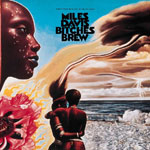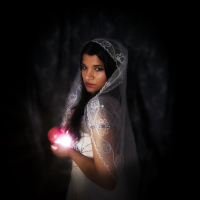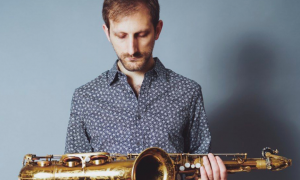Home » Jazz Articles » Interview » Lenny White: Just Doing It
Lenny White: Just Doing It
The friendship level in Return to Forever is much better than in '83 and this is reflected in the music. Actually the best it's ever been, ever.
 Miles Davis kicked the fusion door open in 1969 and some people still haven't gotten over it. Among the future jazz star innovators on Bitches Brew (Columbia/Legacy, 1969) was an unknown eighteen year-old Tony Williams fanatic named Lenny White, who found his recording debut making history. Now an elder statesman at almost sixty, White maintains a furiously fast level of invention tied to an appropriately superhuman technique. Despite recently recovering from shoulder surgery, White packs a punch enviable in a man half his age.
Miles Davis kicked the fusion door open in 1969 and some people still haven't gotten over it. Among the future jazz star innovators on Bitches Brew (Columbia/Legacy, 1969) was an unknown eighteen year-old Tony Williams fanatic named Lenny White, who found his recording debut making history. Now an elder statesman at almost sixty, White maintains a furiously fast level of invention tied to an appropriately superhuman technique. Despite recently recovering from shoulder surgery, White packs a punch enviable in a man half his age.AllAboutJazz: How's the shoulder holding up?
Lenny White: The shoulder is coming along fine thanks but my problem is twofold. I have a spinal impingement that made all my muscles in my right shoulder and arm atrophy. Now it's just about building up my strength and that's getting better.
AAJ: In many ways, this RTF tour and the response you're getting is a major vindication of your original vision. Aren't you sold out in New York?
LW: We have a sold-out show on August 7th [2008] and another show added August 8th.
AAJ: How much do you think resentment over your popularity influenced critics to turn on you?
LW: That could have been a real possibility but it's always hard for artists who are doing something contrary to the norm to gain acceptance from critics. They think their job is to tell the audience what they should listen to and like.
AAJ: Miles took the initial critical heat with Bitches Brew, sessions in which you participated. There are still web chat groups devoted to debating the value of Miles' move. Now, with multi-disc reissues of Miles electric sessions and electric Miles tribute bands dotting the landscape, has fusion gone respectable?
LW: I must clarify, what we did in the early years was called "jazz-rock." It had the sophistication harmonically and somewhat rhythmically of jazz performed over simplistic forms and rock-like rhythms. Critics didn't know what to call it so they called it "jazz-rock." The "fusion" name came latter and now has somewhat cross-collateralized everything to be lumped under that name. There is a real difference and true fans know it.
 AAJ: These are interesting distinctions. If you could elaborate, at what point did the music you were involved in expand from jazz-rock to fusion?
AAJ: These are interesting distinctions. If you could elaborate, at what point did the music you were involved in expand from jazz-rock to fusion?
LW: The distinction should be obvious but if you'd like examples: Tony Williams Lifetime, RTF, Mahavishnu Orchestra, Larry Coryell and The Eleventh House were bands that had big guitar elements relating to the rock sounds of the day. Weather Report and Herbie Hancock's Headhunters had the traditional saxophone lead but were much more progressive than the traditional jazz groups.
An example of what Fusion became is Spyro Gyra or The Yellowjackets. Their directions were clearly defined and more mainstream. All the other bands I named had a direct lineage to Bitches Brew. Their music encompassed many influences—classical music, Brazilian music, rock, soul and electronic music and the no boundaries attitude was the thing that made the music interesting. I believe this is where the name fusion took, because it was indeed a fusion of all these different musical styles.
AAJ: As with any stylistic development, a number of sessions appeared throughout the '70s and early '80s hoping to cash in on the fusion craze, without necessarily capturing the sizzle and pop of the best of the genre. Did uninspired copycats help to diffuse the impact of fusion?
LW: Yes, I do agree with that.
AAJ: You're in the European leg of the RTF tour after having played some North American gigs. Could you describe any differences between your European and American receptions?
LW: The European leg of the tour has been phenomenal. The music has taken a definite upswing and the audiences have been so appreciative. I must say the American audiences were fantastic too, but the music now is so, so much better. We played a concert in Budapest, Hungary that for me was the best RTF has ever sounded.
AAJ: From all reports, Chick Corea was the last holdout for the reunion, but from what I read on fan blogs, it sounds like he's having a great time.
LW: This is very true. We are really having a great time and are talking about new directions musically. The only time you talk about things like that is when you feel musically safe to try new things together.
AAJ: Why did you leave the old RTF?
LW: I didn't leave. That band broke up for artistic differences.
AAJ: Did the '80s RTF reunion tour generate the same enthusiasm as the current one?
LW: Not really, this is something different. The friendship level is much greater than in '83 and this is reflected in the music, which is much better. Actually the best it's ever been, ever.
 AAJ: Will there be a recording this time?
AAJ: Will there be a recording this time?
LW: We will have a live DVD and we are talking about a new studio recording with a somewhat new direction.
AAJ: Because of the strength and athleticism of your work in funk and fusion, it seems your work with the great Buster Williams highlights more subtlety and nuance, with no loss of inventive polyrhythmic punch.
LW: Anytime I get an opportunity to play with masters of this music, it's special. I hold no style of music over any other but what I play with Buster or Ron Carter and many times with Stanley [Clarke] and Chick is heritage for me. Jazz is my heritage; it's not a style of music. What I learned was handed to me from all of my heroes coming up as a young musician. Although I listened to records, what I play was given to me by the masters of the music. I try to represent that every time I play, it's my obligation.
AAJ: I read you're working out an opera. I thought your original idea of duets featuring singers and soloists was a great one. What an incredible opportunity to explore shared aesthetics. Ornette and Placido? I hope you realize that project.
LW: As artists, we have an obligation to push the envelope. I've been involved with or around artists with similar credos all my musical life. I need the challenge, it's what makes you get up and start your day.
AAJ: Have you found a text for the project?
LW: The text is a story that I wrote with a friend who has written some fantastic plays. I'm also working on libretto with a few lyricists. It's a great challenge, but again this is what makes life worth living, the pursuit.

AAJ: Are you still planning a documentary on the history of fusion in jazz?
LW: Yes, that is my intention. I'm compiling interviews, viewpoints, footage. I want to start with Miles and Bitches Brew and go from there.
AAJ: Any plans after the RTF tour?
LW: I plan on recording a new project of my own to be released maybe next year or sooner depending on whether I can finish it in time. I also have a few pop projects I'd like to try to get out. I'm renovating my laboratory so that's going to take some time. And I'm just going to take some time to breathe...
AAJ: Any words of advice for other innovative artists compelled to search new forms and ideas?
LW: Like the Nike ad...Just Do It.
Selected Discography Wallace Roney, Village (Warner Bros, 1996)
Jaco Pastorius, Jaco Pastorius (Epic/Legacy, 1976)
Return to Forever, Hymn of the Seventh Galaxy (Polydor, 1973)
Freddie Hubbard, Red Clay (CTI-CBS, 1970)
Andrew Hill, Passing Ships (Blue Note, 1969)
Miles Davis, Bitches Brew (Complete Sessions) (Columbia-Legacy, 1969)
Photo Credits
Top Photo: Scott Mitchell
Bottom Photo: Bernhard Ley
Tags
PREVIOUS / NEXT
Lenny White Concerts
Support All About Jazz
 All About Jazz has been a pillar of jazz since 1995, championing it as an art form and, more importantly, supporting the musicians who make it. Our enduring commitment has made "AAJ" one of the most culturally important websites of its kind, read by hundreds of thousands of fans, musicians and industry figures every month.
All About Jazz has been a pillar of jazz since 1995, championing it as an art form and, more importantly, supporting the musicians who make it. Our enduring commitment has made "AAJ" one of the most culturally important websites of its kind, read by hundreds of thousands of fans, musicians and industry figures every month.























